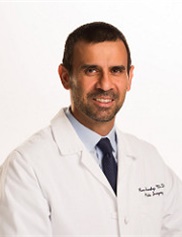Grants Funded
Grant applicants for the 2024 cycle requested a total of nearly $3 million dollars. The PSF Study Section Subcommittees of Basic & Translational Research and Clinical Research evaluated more than 100 grant applications on the following topics:

The PSF awarded research grants totaling over $650,000 dollars to support more than 20 plastic surgery research proposals.
ASPS/PSF leadership is committed to continuing to provide high levels of investigator-initiated research support to ensure that plastic surgeons have the needed research resources to be pioneers and innovators in advancing the practice of medicine.
Research Abstracts
Search The PSF database to have easy access to full-text grant abstracts from past PSF-funded research projects 2003 to present. All abstracts are the work of the Principal Investigators and were retrieved from their PSF grant applications. Several different filters may be applied to locate abstracts specific to a particular focus area or PSF funding mechanism.
Peripheral Nerve Repair Using Peptide Amphiphile Nanofibers
Reza Jarrahy MD
2017
The Regents of the University of California, Los Angeles
National Endowment for Plastic Surgery Grant
Peripheral Nerve, Microsurgery
The long-term goal for this research proposal is to address treatment strategies to improve outcomes from segmental peripheral nerve defects.
Without working nerves, limbs cannot move or feel, and the risk of completely losing function in that limb is high. Nerve injuries can be repaired in multiple ways. Nerve conduits are hollow tubes that can be made from biologically inert materials. They serve to protect the nerve ends and place them close to each other so they might grow into each other and heal. However, these conduits are hollow and lack an internal skeleton to guide the growth of cells that can migrate from the cut nerve ends.
In this study, we will test a new nerve graft that includes a conduit filled with a unique internal support made from a special gel comprised of proteins that can be braided together using simple, low energy reactions. The gel can be shaped into a noodle, like the form a nerve. These protein braids can help with nerve repair by acting as a highway along which nerve cells can grow and regenerate, thereby allowing for faster repair. Special patterns (signaling molecules) can also be designed into the braid that triggers the cells to grow and regenerate faster. We will demonstrate in rabbits that when a commercially available tubes is filled with our unique gel and is used to repair a long-gap nerve found in rabbit hind legs, the rabbit will regain function in that limb faster than current commercially available product. We will also plan to initiate the preliminary safety tests in order to prepare for the pre-clinical safety tests.
From this study, patients can regain the use their injured limbs more quickly and completely.
 Reza Jarrahy, MD, FACS, FAAP is a board-certified plastic surgeon who has served on the full-time faculty of the David Geffen School of Medicine at UCLA since 2007. He specializes in craniofacial reconstructive surgery in children and adults, pediatric plastic surgery, and in cosmetic and surgery of the face and body. He is Co-Director of the UCLA Craniofacial Clinic, Co-Director of the UCLA Face Transplant Program, and Assistant Chief of Plastic Surgery at Olive View-UCLA Medical Center. Dr. Jarrahy earned his B.S. in Biology from Stanford University (1992) and his M.D. from SUNY Stony Brook (1996). He completed his plastic surgery residency and craniofacial surgery fellowship at UCLA. In addition to his clinical work, Dr. Jarrahy also directs a productive research laboratory which focus on tissue engineering research and clinical research relevant to craniofacial surgery and other fields in plastic surgery. He is the recipient of numerous research awards and grants and the author of many scientific publications, abstracts, and book chapters. He serves on the Board of the American Society of Maxillofacial Surgeons, contributing to national educational programs in craniofacial surgery. Dr. Jarrahy also regularly travels overseas to provide free reconstructive surgery to children in developing nations.
Reza Jarrahy, MD, FACS, FAAP is a board-certified plastic surgeon who has served on the full-time faculty of the David Geffen School of Medicine at UCLA since 2007. He specializes in craniofacial reconstructive surgery in children and adults, pediatric plastic surgery, and in cosmetic and surgery of the face and body. He is Co-Director of the UCLA Craniofacial Clinic, Co-Director of the UCLA Face Transplant Program, and Assistant Chief of Plastic Surgery at Olive View-UCLA Medical Center. Dr. Jarrahy earned his B.S. in Biology from Stanford University (1992) and his M.D. from SUNY Stony Brook (1996). He completed his plastic surgery residency and craniofacial surgery fellowship at UCLA. In addition to his clinical work, Dr. Jarrahy also directs a productive research laboratory which focus on tissue engineering research and clinical research relevant to craniofacial surgery and other fields in plastic surgery. He is the recipient of numerous research awards and grants and the author of many scientific publications, abstracts, and book chapters. He serves on the Board of the American Society of Maxillofacial Surgeons, contributing to national educational programs in craniofacial surgery. Dr. Jarrahy also regularly travels overseas to provide free reconstructive surgery to children in developing nations.